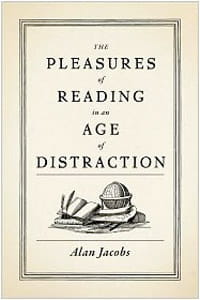 In The Pleasures of Reading in an Age of Distraction, Alan Jacobs gives the lie to many myths about reading in contemporary life. People do read a lot today, both online and off. E-readers and other media technologies do not signal the end of books. And an overabundance of distractions is not a problem unique to our time—people who read have always struggled to find time and space to read, and have always worried about how well they are reading.
In The Pleasures of Reading in an Age of Distraction, Alan Jacobs gives the lie to many myths about reading in contemporary life. People do read a lot today, both online and off. E-readers and other media technologies do not signal the end of books. And an overabundance of distractions is not a problem unique to our time—people who read have always struggled to find time and space to read, and have always worried about how well they are reading.
Jacobs, author of The Narnian and a professor of English at Wheaton College, also comes armed with good news—mainly that our reading lives can and should be governed by whim. I invited Jacobs to reflect on this argument from Pleasures, and on the role religion might play in the life of the reader.
What motivated you to write a book on reading?
It really started with a senior-level seminar on the history of reading I have taught have at Wheaton often over the years. And I started teaching that seminar because it seemed to me that we were sending our English majors out into the world having taught them a good deal about how to be little academics—about writing scholarly papers and engaging in scholarly research—and precious little about what most of them would be doing for the rest of their lives, which is reading for enjoyment whenever they can spare the time. (It's a real shame when English professors have something to say about reading only to those who are themselves going to become professors, but that's often the way it happens.)
So my thinking about how to encourage my graduating students to have healthy reading lives with no teachers around to tell them what to do was the seed from which this book grew.
What's wrong with the idea of a category of books that are "guilty pleasures"?
Mainly the "guilty" part, because the guilt arises from the (often unspoken and even unformulated) sense that we ought to be reading Great Books all the time. But that would be like eating a seven-course French meal every day. Of all the passages I quote in my book, perhaps my favorite one is this, from W. H. Auden: "When one thinks of the attention that a great poem demands, there is something frivolous about the notion of spending every day with one. Masterpieces should be kept for High Holidays of the Spirit."
This book forced me to think about the role that vanity has played in my own reading life. I adore the crime novelist Dennis Lehane, for example, and while I don't feel guilty while reading him—I love his hard-boiled language and his sharp sense of moral outrage—I have felt embarrassed to celebrate him to my readerly friends. How can a reading life guided by whim help me overcome such vanity (and silliness)?
The Auden quote above is key. Also something C. S. Lewis once said: "When I was ten, I read fairy tales in secret and would have been ashamed if I had been found doing so. Now that I am fifty I read them openly. When I became a man I put away childish things, including the fear of childishness and the desire to be very grown up." When we're young our reading—like our choices of clothing and music—tends to be a matter of signaling who we are to the world. And that's not altogether a bad thing, or not always. But at some point we need to become mature enough, and perhaps confident enough in the good will and affection of our friends, to say, "Look, this is among the things I like to read." And then, you know, it's fun to try to get people to share in our enthusiasms, isn't it?
You critique the idea of reading lists and of slogging through canons. But you also advocate aspirational reading: "Some intellectual labors are worth the trouble." How can our reading labors be governed by pleasure?
This has a lot to do with thinking in more serious ways about where the pleasure comes from. Many people who love Tolkien think that what they love is just Tolkien—but Tolkien would tell you that much of what you love in his books stems from his skill in channeling the medieval writers that he loved. Our admiration for certain writers can lead us to pursue what they admired, which can often give a double pleasure: the pleasure of understanding a favorite author better and the pleasure of making a new reading discovery.





